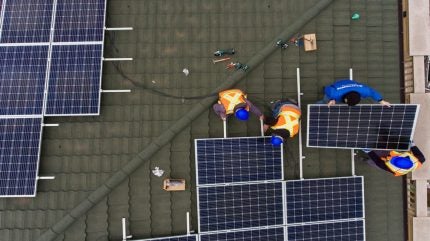
A study conducted by the United Nations Development Programme (UNDP), the University of Denver’s Pardee Institute, and Octopus Energy has revealed that aligning renewable energy targets with supportive development policies and financing strategies could lead to substantial economic gains.
This approach is projected to generate $20tn in cumulative savings in the energy sector by 2060, boosting the GDP by 21%. It will raise average per capita GDP by approximately $6,000, compared to continuing with current practices.

Discover B2B Marketing That Performs
Combine business intelligence and editorial excellence to reach engaged professionals across 36 leading media platforms.
The study assessed the potential triple benefits of renewable energy: emissions reduction, economic growth, and social advantages.
The study’s simulation of three scenarios revealed stark contrasts in outcomes.
The Base Case scenario, which assumes a continuation of current trends without increased ambition, predicts over 50% of energy production from fossil fuels by 2060, leading to a potential 2.6°C rise in global temperatures.
This could severely hinder progress in essential services and push millions into extreme poverty.

US Tariffs are shifting - will you react or anticipate?
Don’t let policy changes catch you off guard. Stay proactive with real-time data and expert analysis.
By GlobalDataIn contrast, the renewables acceleration scenario envisions a world with increased energy efficiency and renewable energy usage while reducing fossil fuel reliance to 12% by 2060.
This scenario aligns with limiting the global temperature increase to below 2°C.
The most comprehensive scenario, which combines renewable energy acceleration with development targets, forecasts significant social improvements. These include universal access to electricity and clean cooking, lifting 193 million people from extreme poverty, preventing malnutrition for 142 million, and providing 550 million more people with clean water and sanitation.
Financially, this scenario offers $20.4tn in savings, with $8.9tn from energy efficiency and $11.5tn from reduced renewable energy costs.
Investments in clean energy are forecasted to reach a record $2.2tn in 2025, with renewable power capacity at 4,448GW, representing over 90% of new power additions. Innovations in solar, wind, and storage technologies are propelling this growth.
Despite these advancements, fossil fuels still represent more than 70% of the global energy supply. In 2024, global energy demand increased by 2.2%, and while renewables led this growth, fossil fuels still accounted for 54% of the rise.
Concurrently, the rate of energy efficiency improvements has halved compared to the previous decade.
UNDP Climate Change global director Cassie Flynn said: “Today, the world faces a dual challenge: advancing human well-being while mitigating the environmental impacts of fossil-fuel-driven development.
“This study shows us that a clean energy future is possible – but we must choose to embed renewable ambition into climate plans linked to inclusive development policies.”





